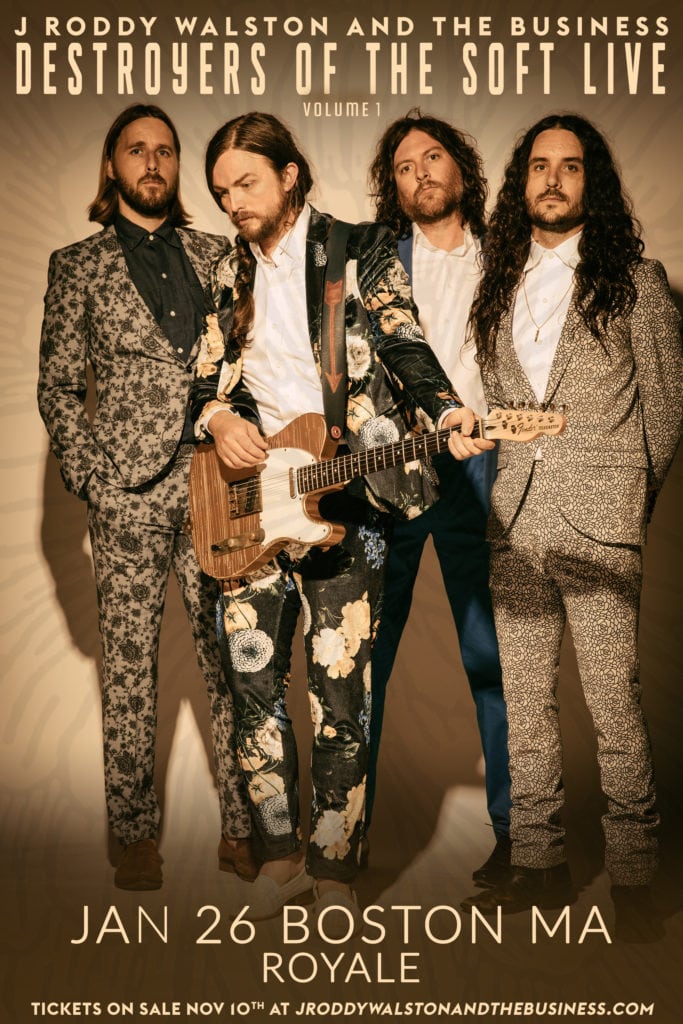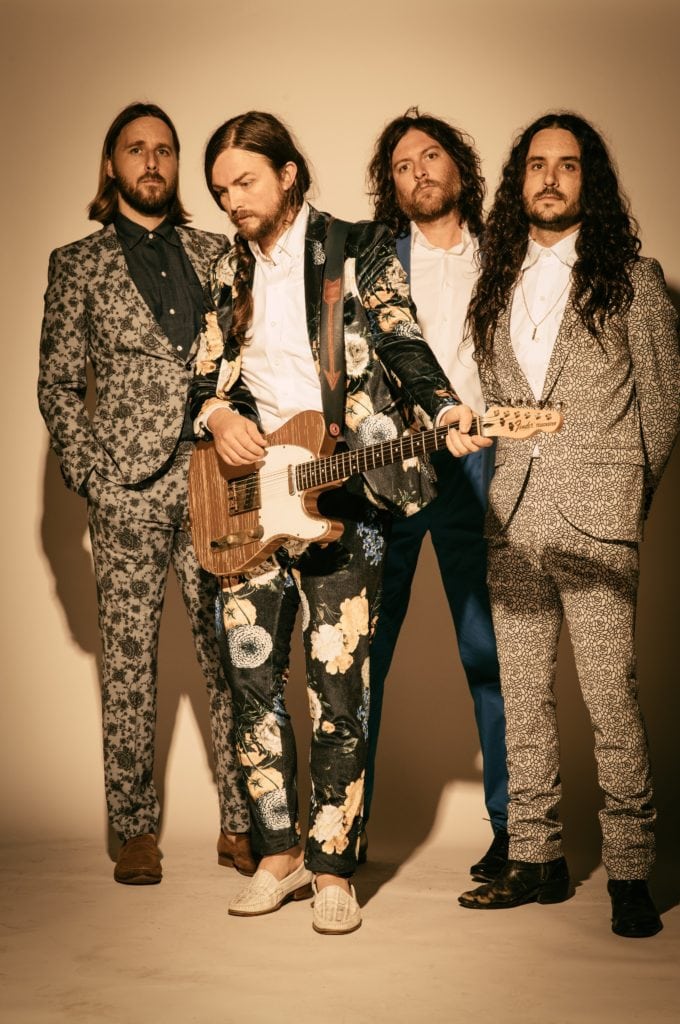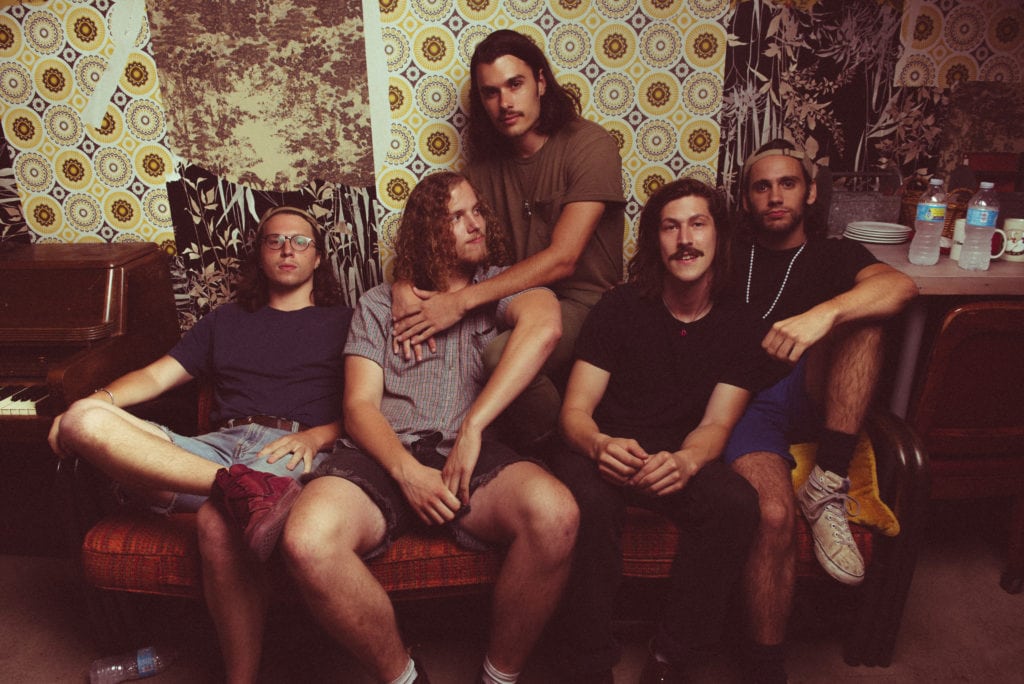Bowery Boston presents
Doors: 6:00 pm / Show: 7:00 pm
This event is 18 and over. Patrons under 18 admitted if accompanied by a parent or legal guardian. Please note: bags or backpacks larger than a purse are prohibited.
Tickets on sale Fri. 11/10 at 10AM!
Tickets available at AXS.COM, or by phone at 855-482-2090. No service charge on tickets purchased in person at The Sinclair Box Office Wednesdays-Saturdays 12-7PM.
***
***
J. Roddy Walston and the Business
Heading into Destroyers of the Soft Life, the fourth LP by J. Roddy Walston and The Business set to be released September 29 via ATO Records, JRWATB pursued a brighter, more nuanced sound that teased out the band’s latent pop sensibilities without skimping on energy or attitude. As you press play on the opening track “You Know Me Better”, anthemic guitars scream out of buoyant, hooky lyrics as Walston’s chugging piano supplies a persistent heartbeat. The “bar band” sound of the past has been replaced by an aspirational, booming cacophony that could fill stadiums.
Instead of the raucous bombast JRWATB manifested on their breakout hit album Essential Tremors, the band’s leader had certain rules he was determined to follow on Destroyers of the Soft Life. One was: “Speak/sing clearly, no hiding behind mumbles.” Another was, “D.I.Y. but hi-fi — record ourselves as much as possible but have it sound amazing and full.” The final, most important, rule was, “Nostalgia is a cancer — acknowledge that you are in the present.”
“We had never been a band where we pretended that it’s 1965,” Walston says. “But we ended up in situations with our records where those rules were imposed on us.”
On Essential Tremors, JRWATB inspired pangs of joy in music fans that yearn for the days of Bob Seger and early Bruce Springsteen. But when Walston returned home from touring in 2015 and began contemplating his next move, he no longer felt the same connection to that classic-rock sound.
“Loud rock and roll music has become less relevant because it’s just been on a loop,” he says. “If there was any rule on this record, it was, let’s be a part of music right now. I want to be part of living music in this moment.”
Helping the band realize a new vision for its music was veteran producer Phil Ek (Built To Spill, Father John Misty, Fleet Foxes), who came in to apply some finishing touches after JRWATB completed most of the record in Virginia.
“The thing with Phil is he is a servant of the song and that is my vibe as well,” Walston says. “Ego has no place in songwriting or the studio and we hit it off in that respect right away.”
“Is there any point to making a record that has real instruments (guitars, drums, piano etc.) right now?” he continues. “Is there anything left to be said by writing this way? Do albums matter anymore? Can I make something that I care about right now because it’s a manifestation of the fear/love/excitement/ I am feeling right now, not because is tickles some easy to reach nostalgic pleasure center.”
Lead single “The Wanting” boasts a shimmering, uplifting guitar riff and an impossibly huge chorus that belies the song’s thoughtful exploration of familial relationships and the fallacy of distilling complicated people down to archetypes. “Did you do right by us / best it could be,” Walston sings, addressing a prodigal father figure. “You’ve done no harm / but you’ve been no good to me.”
Throughout Destroyers of the Soft Life JRWATB similarly melds engaging, melodic songwriting with sharp observations about American culture that take on a new kind of power in light of the 2016 presidential election. Standout tracks such as the infectious “Ways And Means” and swaggering “Blade Of Truth” offer the uncompromised, salt-of-the-Earth perspective of a songwriter who grew up among the white working class and yet has enough perspective to see the ways in which those people have undermined themselves in the political realm. As Walston sings in “Blade of Truth,” there is now “a judgement on the herd / and your privilege will burn.”
Amid the torn-from-the-headlines commentary, Walston revisits the same question: “Is the truth a hard line, or it is a flexible line that can be messed with?”
“I got to straddle the line a bit with this record,” he says. “I hit a point in my life where I could pay my bills on time for the first time ever, and take a breath. I got to see the life you can have when you’re not living a life of desperation. But I was just outside that line of desperation.”
The band’s newfound financial security is largely the result of the band’s hard work on the road. Looking back on the tour cycle for Essential Tremors, Walston can only chuckle.
“We probably toured on it way longer than our contemporaries would,” he admits.
Of course, not many bands experience the sort of growth in prominence and audience size that Walston and his compatriots have witnessed in the past several years. Road warriors from the time they formed in 2002, JRWATB has long been an underground favorite, toiling away in clubs and bars and carving out its own niche outside of the rock mainstream. But the radio success of Essential Tremors opened new doors and fostered exciting opportunities, including invites to Lollapalooza, the Newport Folk Festival, and Bonnaroo, and a featured slot in an episode of the prestigious music TV institution, Austin City Limits. With every new experience came requests to play more shows.
“The train just kept rolling,” Walston says, until finally he hit a wall. “By the time I came off the road, I thought, ‘I’m toast. I don’t have anything in the tank.’”
Walston’s world was also rocked by a huge life-changing event — the birth of his first child. “I think having a kid made me care less of what people think of me,” he says. “I have one ultimate mission right now — keep a human alive. I don’t care if someone doesn’t like my pants or my hair or whatever. Being a parent makes you powerful in that way.”
Over the next year and a half, Walston committed to building himself and his band back up into a new kind of rock ‘n’ roll beast. But before JRWATB could get started on its fourth album, Walston decided to do some literal construction on a new space for the band where it could rehearse and record.
The only space available in the band’s hometown of Richmond, Va. hardly seemed promising — it was “a completely annihilated warehouse” that had been a grenade factory during World War II, says Walston, who decided to rent the place after the landlord offered the first two month’s rent for free. Perhaps the landlord expected JRWATB to eventually pack up and retreat. But that guy clearly knows nothing about this band’s work ethic, or affinity for lost causes. Instead of giving up, they gutted the place and spent the next seven months rehabbing the building until it was transformed into a suitable headquarters for JRWATB.
Why go to all the trouble of making your own space when there are any number of established studios where you can make your record? For JRWATB, like it is with so many things in their lives, building a personal studio was a matter of principle. When you’re renting studio time, it’s always somebody else’s time. For once, Walston wanted to make a record on his time.
“I don’t listen to our old records because I get so stressed when I think about making them,” he says, reflecting on how rushed the band was in the studio back then. “We’re taking the experience back.”
***
Post Animal
Post Animal is a psych rock band born and bred in the roaring music hub that is Chicago, Illinois. True to their DIY roots, they feel most at home playing in a crowded basement surrounded by dancing strangers and sweaty friends. Members include Dalton Allison, Jake Hirshland, Javi Reyes, Wesley Toledo and Matt Williams.
Moving and grooving as this six-piece since 2016, the boys of Post Animal developed a loyal fan base early on following their single “When I Get Home,” which landed them shout outs in Paper Mag, Vice and NME.






